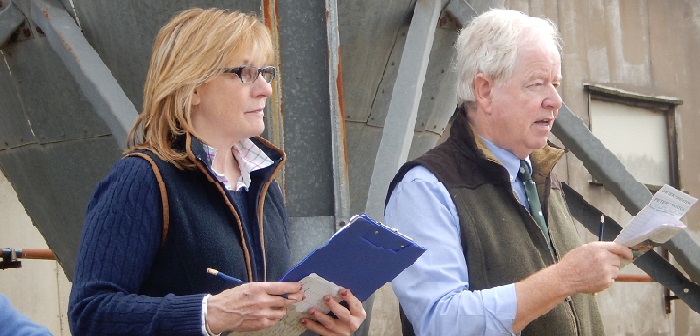It’s been difficult to find too many positives as far as the pig market is concerned, with the SPP dropping to its lowest level since being introduced in June 2014 of 129.33p (for those of you wondering about the launch price in those far off days, it was 164.02p!). Some big kills are taking place next week, which at least should help to keep numbers under control as the dreaded C-word (Christmas in case you wondered) approaches.
Spot bacon buyers are reporting another quiet week, and as a result, nobody was coming out offering more money and prices tended to be at a reluctant stand-on, or in some cases a shade easier, with one-off loads of spot pigs trading in the 125 to 127p range, but regular sellers benefitting from an extra copper or two.
Most weekly contribution prices have remained at similar levels, but for those sellers with prices tied to the SPP, finished pig cheques look as though they will continue to get smaller in the weeks ahead.
Sow prices have also held at stand-on levels, reflecting a virtually static euro that traded on Friday afternoon worth 74.04p, compared with 74.22p a week ago.
As a result, cull sow quotes have generally remained within a fairly tight 62p to 65p band, but UK numbers are reported to be a shade easier so there could possibly be a bit more interest around the corner on the sow front.
Nothing much to write home about as far as weaner prices are concerned, and although one or two buyers are “nibbling” a glance at the calendar dictates that today’s 30kg weaners will probably be ready as finished pigs sometime between Christmas Eve and New Year’s Day, whereas 7kg piglets might be facing a slightly better future as spring approaches, which is often the time pig prices recover after a long, drab winter.
Feed prices are continuing their stealthy rise, with ex-farm feed wheat up a couple of £/t and now quoted in Farmers Weekly at £106.50/t, but it’s hard to find sellers at this level. Futures prices have got more black ink than red with November feed wheat quoted at £116/t and more distant months significantly ahead of this with July next year at £127.35/t and January 2017 at £134.35/t.
Although cereal price rises can hardly be described as a surge, they’ve been quietly moving ahead during the past couple of months, and for those arable farmers who’re under the misapprehension that pig producers are benefitting from much cheaper feed prices, it’s worth remembering that this time a year ago the spot ex-farm feed wheat price was £106.90/t, which is only 40p higher than where it is today!
Dry weather in parts of the US is one of the reasons why wheat prices have tended to harden, although crop drilling conditions in the UK are close to ideal in many parts of the country.
And finally, news that a new 12 country Pacific Pact is being put together, including the US, Japan, New Zealand and Canada, will open these huge, global production centres for truly international trade, and if ratified, the trans-Pacific partnership could account for about 40% of the global economy and put Europe’s share of worldwide trade at risk.
With the Putin blockade already causing significant problems in the pigmeat supply chain, the last thing we want to see will be any pesky Pacific pork traders benefitting from this free trade pact.




